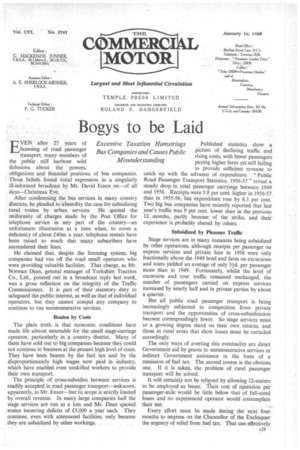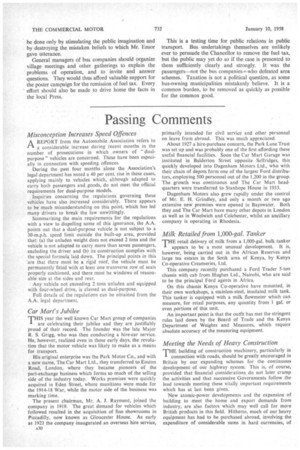Bogys to be Laid
Page 31

Page 32

If you've noticed an error in this article please click here to report it so we can fix it.
EVEN after 27 years of licensing of road passenger transport, many members of the public still harbour wild delusions about the powers, obligations and financial positions of bus companies. Those beliefs found vocal expression in a singularly ill-informed broadcast by Mr. David Ensor on—of all days—Christmas Eve.
After condemning the bus services in many country districts, he pleaded to absurdity the case for subsidizing rural routes by urban services. He quoted the uniformity of charges made by the Post Office for telephone service in any part of the country—an unfortunate illustration at a time when, to cover a deficiency of about £40m. a year, telephone rentals have been raised so much that many subscribers have surrendered their lines.
He claimed that, despite the licensing system, big companies had run off the road small operators who were providing valuable facilities. That charge, as Mr. Norman Dean, general manager of Yorkshire Traction Co., Ltd., pointed out in a broadcast reply last week, was a gross reflection on the integrity of the Traffic Commissioners. It is part of their statutory duty to safeguard the public interest, as well as that of individual operators, but they cannot compel any company to continue to run unremunerative services.
Beaten by Costs The plain truth is that economic conditions have made life almost untenable for the small stage-carriage operator, particularly in a country district. Many of them have sold out to big companies because they could not continue in business at the present high level of costs. They have been beaten by the fuel tax and by the disproportionately high wages now paid in industry, which have enabled even unskilled workers to provide their own transport.
The principle of cross-subsidies between services is readily accepted in road passenger transport—unknown, apparently, to Mr. Ensor—but its scope is strictly limited by overall revenue. In many large companies half the stage services are run at a loss and Mr. Dean quoted routes incurring deficits of £5,000 a year each. They continue, even with attenuated facilities, only because they are subsidized by other workings, . Published statistics show a picture of declining traffic and rising costs, with fewer passengers paying higher fares yet still failing to provide sufficient revenue to catch up with the advance of expenditure. "_Public Road Passenger Transport Statistics, 1956-57" reveal a steady drop in total passenger carryings between 1949 and 1956. Receipts were 5.8 per cent. higher in 1956-57 than in 1955-56, but expenditure rose by 6.3 per cent. Two big bus companies have recently reported that last year's traffic was 9 per cent, lower than in the previous 12 months, partly because of the strike, and their experience is probably shared by others.
Subsidized by Pleasure Traffic Stage services are in many instances being subsidized by other operations, although receipts per passenger on express services and private hire in 1956 were only fractionally above the 1949 level and fares on excursions and tours yielded an average of only 31d. per passenger more than in 1949. Fortunately, whilst the level of excursion and tour traffic remained unchanged, the number of passengers carried on express services increased by nearly half and in private parties by about a quarter.
But all public road passenger transport is being increasingly subjected to competition from private transport and the opportunities of cross-subsidization become correspondingly fewer. So stage services must to a growing degree stand on their own returns, and those in rural areas that show losses must be curtailed accordingly.
The only ways of averting this eventuality are direct Government aid by grants to unremunerative services or indirect Government assistance in the form of a remission of fuel tax. The second course is the obvious one. If it is taken, the problem of rural passenger transport will be solved.
It will certainly not be relieved by allowing 12-seaters to be employed as buses. Their cost of operation per passenger-mile would be little below that of full-sized buses and no experienced operator would contemplate their use.
Every effort must be made during the next four months to impress on the Chancellor of the Exchequer the urgency of relief from fuel tax. That can effectively: A29 be done only by stimulating the public imagination and by destroying the mistaken beliefs to which Mr. Ensor gave utterance.
General managers of bus companies should organize village meetings and other gatherings to explain the problems of operation, and to invite and answer questions. They would thus afford valuable support for the poster campaign for the remission of fuel tax. Every effort should also be made to drive home the facts in the local Press. This is a testing time for public relations in public transport. Bus undertakings themselves are unlikely ever to persuade the Chancellor to remove the fuel tax, but the public may yet do so if the case is presented to them sufficiently clearly and strongly. It was the passengers—not the bus companies-J-who defeated area schemes. Taxation is not a political question, as some bus-owning municipalities mistakenly believe. It is a common burden, to be removed as quickly as possible for the common good.
















































































































